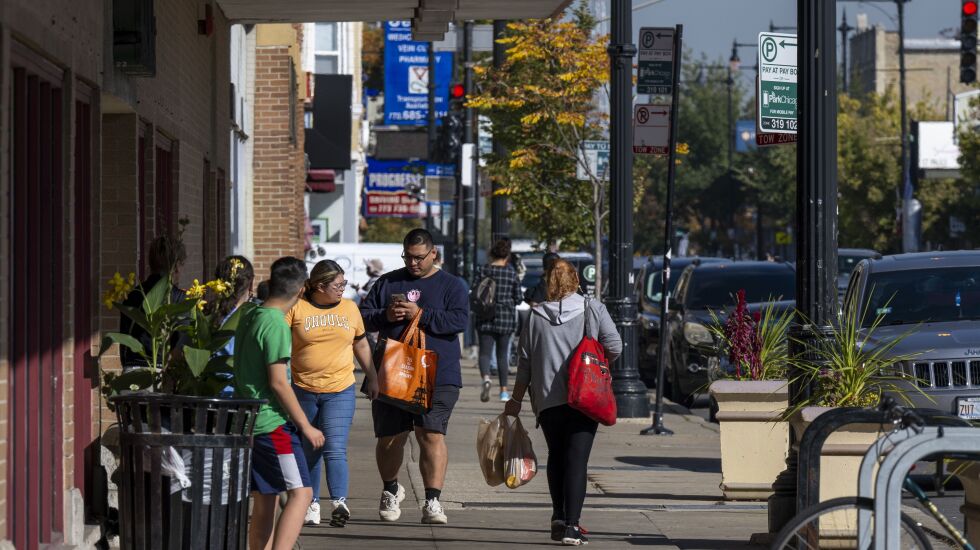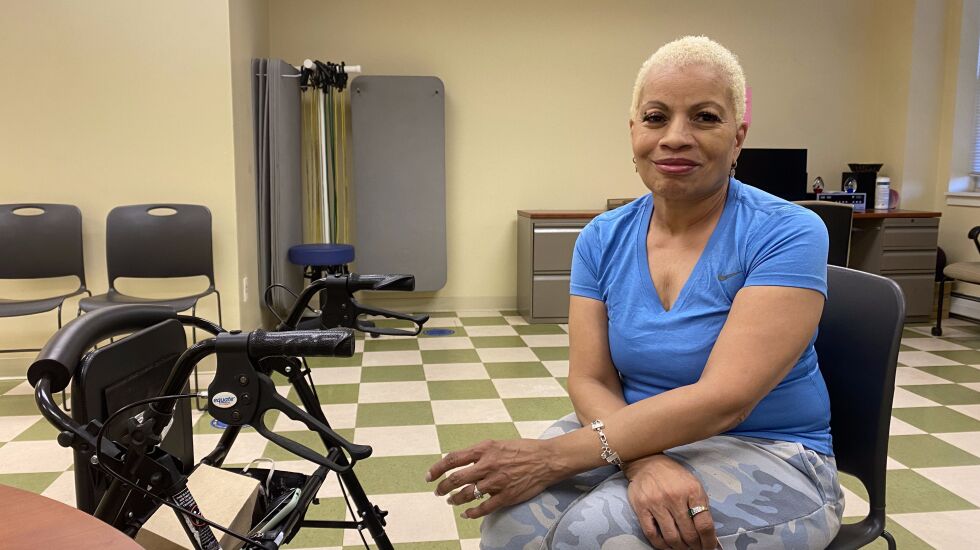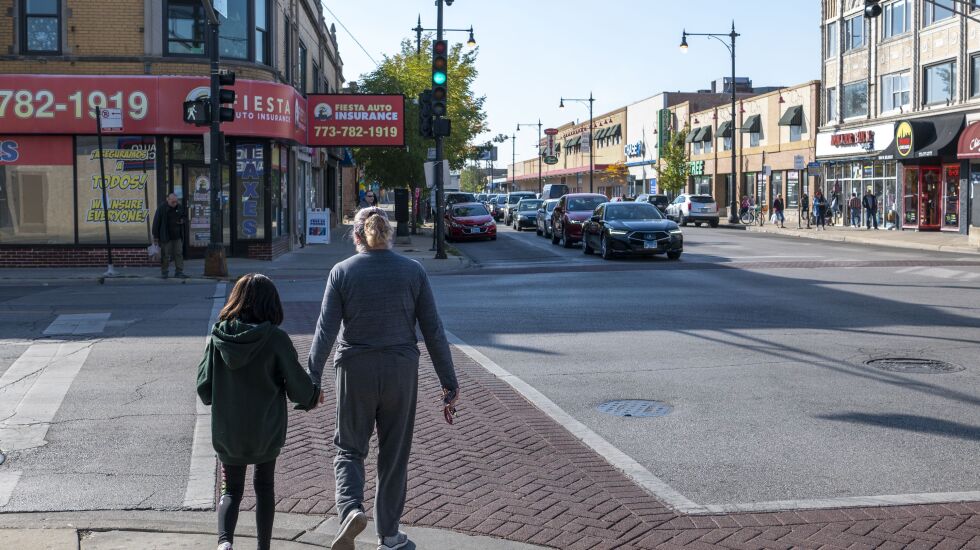
Politicians don’t stop in Belmont Cragin — ever.
At least that’s what some residents of the Northwest Side neighborhood insist.
And for that, many of them couldn’t tell a reporter who is on the ballot next month, who their state or U.S. representatives are, or why they should even care about casting their votes, since nothing seems to change.
“Politicians don’t really show their face in all the years that I’ve lived here,” 30-year resident Melissa Quintana said. “I’ve never known any alderman’s name, don’t know how many aldermen we have, I didn’t know the wards, or our representatives — I literally know nothing.”
What residents readily share is their concerns that the obstacles that lie in front of them are becoming ever more difficult to overcome. Soaring home prices, crime, the quality of education and the struggles of small businesses are all making life more challenging.
“My family lives in New York, and they have rent control, I’m like, why don’t we have that here?” asked Annette Cabasa, 62. “I lived in Chicago my whole life, and rent was never a big concern for us until I will say the last 10 years — ever since the recession I want to say.”
Tucked on the Northwest Side, Belmont Cragin is bounded by Grand Avenue to the south, Belmont Avenue to the north, Kenton Avenue to the east and Nashville Avenue to the west. As voters prepare to cast their ballots in state, county and federal elections next month, the Sun-Times talked to residents to find out what’s on their minds.
Many said they wish their elected officials would do the same.
Quintana said over the past three months she has made it a priority to learn the names of the politicians who represent her, but she admits she still is falling short.
“Everyone in my circle doesn’t know about their alderman, never met them, know their names or even know what ward they live in,” Quintana said. “Even with the potential candidates that are running, I still have no idea who’s running for reelection, and it’s not easily accessible.”
“I can only speak for myself and my circle of people — I’ve never seen, heard from or anything of a politician,” Quintana said.

Quintana, 31, said she understands the importance of voting, but it’s hard to commit to doing so when politicians have done so little to win her support, not to mention the time pressures of every-day life.
Her desire to become more politically active was largely sparked by her role in Belmont Cragin’s Community Ambassador Program — a city initiative to create friendly atmospheres in shopping corridors.
While she said she doesn’t know much about national or state issues, she knows the community is in desperate need of basic things, such as more public trash cans.
“I can’t talk about national issues, but I want to focus on Belmont Cragin, for instance, why don’t we have any garbage cans?” Quintana said as she chuckled in disbelief.
The dozens of people who spoke with the Chicago Sun-Times said the neighborhood’s long history of being a working-class community that puts its head down and doesn’t stir the pot contributes to it so often being forgotten.
One neighborhood, three wards
It should be a neighborhood with more clout considering it is the fifth largest community area in the city and is home to the largest Hispanic population in Chicago.
Of the more than 78,000 people who call Belmont Cragin home, nearly 80% are Hispanic, 14% are white, 2% are Black and 2% are Asian, according to the most recent U.S. Census figures.
But adding to the confusion for residents, the Belmont Cragin community area is divided among multiple wards and state representative districts, meaning residents of nearby blocks can have different representatives in the City Council or state Legislature.
The neighborhood is roughly split between three different Illinois House districts as well as the 30th, 31st and 36th wards, which fit together like pieces of a jigsaw puzzle.
That’s a half dozen different local elected officials all representing different slices of the neighborhood.

The three wards all went strongly Democratic in the 2020 presidential election, giving Joe Biden between nearly 74% and a little over 80% of their votes, depending on the ward. The numbers were comparable in the 2018 governor’s race, with Democrat J.B. Pritzker’s winning totals ranging from about 78% to nearly 83%.
While many residents said they worry about housing, Belmont Cragin actually presents more affordable living than neighboring Logan Square and Avondale, which is under rapid gentrification.
As she sat in the computer room of the Senior Suites of Kelvyn Park, Cabasa reflected on being pushed out of Avondale because of housing costs. She said being able to qualify for housing at the senior center, which is at 2715 N. Cicero Ave., was a blessing from God, but she recognizes others in similar situations may not have been so lucky.

Being housing insecure for much of the last two years has her worried about affordable rent. She’s on a fixed income and can’t take the blow of her rent suddenly increasing.
Cabasa remains an undecided voter — she isn’t sure who is on the ballot this come November — but the policies she advocates have a generally liberal bent.
If Pritzker is reelected governor, she hopes he will focus on bringing some form of rent control.
Thirty years ago Cabasa said she said she moved into a Bucktown apartment with her then infant child, and her rent was just $275 for two bedrooms. Adjusted for inflation to 2022 dollars, that is about $600.
“It was cold, but that is something I will never see again,” Cabasa said. “I will never see those prices again, especially in Bucktown.”
A religious woman who often refers to the Bible when she talks, Cabasa said another issue dear to her was the national fight over the rights to have an abortion.
“Look, I believe we are in the end times unfortunately, and a woman still should have the choice whether she wants to have an abortion or not,” Cabasa said. “It’s not anyone else’s decision but that woman, and she shouldn’t have to give a reason for it.”
‘People are really struggling to survive here’
Obviously, some residents are more politically tuned in, but they understand why others are not.
For nearly 20 years, Alonso Zaragoza has operated the social media group called Belmont Cragin United. He initially launched the group on the social media platform Myspace, but he has since migrated the group to Facebook where it boasts 41,000 members.
His group, he said, is inundated with hundreds of messages daily and feels he has his finger on the pulse of the neighborhood.
“People are really struggling to survive here, and they are working 60 to 70 hours a week,” Zaragoza said. “They don’t have the time to go on the news and learn about which politicians are supporting what when they are just constantly working to keep their doors open and lights on.”
Zaragoza, 42, said he started becoming politically active only after launching the community group’s social media account. He also ran an unsuccessful campaign for 36th Ward alderman in 2015, something he has no interest in doing again.

Zaragoza, an independent who plans to vote Democrat this election, said candidates need to stop overlooking Belmont Cragin.
“I think politicians need to really spend at least one day touring the community with residents and our local nonprofits to really see what we are going through,” Zaragoza said. “I don’t think they really know what is happening here.”
Zaragoza said he is not for rent control but said rent is becoming unbearable as wages have remained stagnant. Just a few years ago, he said, you could find a two-bedroom apartment for $900 but now that runs at the minimum of $1,200.
“Then there is the difficulty of just buying a home here,” Zaragoza said. “There is this three-flat near Armitage and Laramie that is going over $800,000, I don’t think I’ve ever seen anything residential sell that high here before.”
‘Too many promises made and rarely any results’
Esterine Brooks, 69, who also lives at the Senior Suites of Kelvyn Park, said one of her biggest interests is the quality of education. She worked at the Chicago Board of Education for more than 40 years.
“My concern is about the children and the special needs children,” Brooks said. “They are not getting the proper education or care in neighborhoods like this.”
Brooks said the move to remote learning during the COVID-19 pandemic left a lot of children and families behind. She hopes whoever is elected can help bring those kids back to where they should be.
“There just needs to be more aid for students with disabilities because they have been forgotten about even before the pandemic,” Brooks said. “We can’t continue to forget about the needs of those children.”

Jose Corea opened Tepalcates Mexican Restaurant at 5131 W. Fullerton Ave. just five months ago. He says he considers himself a Democrat but has been jaded by the sport of politics.
“I just want my streets to be cleaner, they need to get rid of these paid parking meters on Fullerton but honestly, I stay out of politics,” Corea said. “Too many promises made and rarely any results.”
Corea believes the parking meters have hindered his business even though he says he can’t prove it.
But one thing this self-identified Democrat knows for sure, he won’t be voting for Pritzker. He also couldn’t tell you who Republican challenger Darren Bailey was either.
“I’ve seen too many things from [Pritzker] that I don’t like,” Corea said, refusing to elaborate. “But honestly I don’t like politics.”







